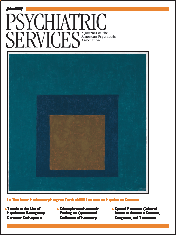Race, Gender, and Psychiatrists' Diagnosis and Treatment of Major Depression Among Elderly Patients
Abstract
OBJECTIVE: This study examined psychiatrists' contributions to racial and gender disparities in diagnosis and treatment among elderly persons. METHODS: Psychiatrists who volunteered to participate in the study were randomly assigned to one of four video vignettes depicting an elderly patient with late-life depression. The vignettes differed only in terms of the race of the actor portraying the patient (white or African American) and gender. The study participants were 329 psychiatrists who attended the 2002 annual meeting of the American Psychiatric Association. RESULTS: Eighty-one percent of the psychiatrists assigned the elderly patient a diagnosis of major depression. Patients' race and gender was not associated with significant differences in the diagnoses of major depression, assessment of most patient characteristics, or recommendations for managing the disorder. However, psychiatrists' characteristics, particularly the location of the medical school at which the psychiatrist was trained (United States versus international), were significantly associated with a number of variables. CONCLUSIONS: Given standardized symptom pictures, psychiatrists are no less likely to diagnose or treat depression among African-American elderly patients than among other patients, which suggests that bias based simply on race is not a likely explanation for racial differences in diagnosis and treatments found in earlier clinical studies. The impact of psychiatrists' having trained at international medical schools on diagnosis, treatment, and judgment of several patient attributes may indicate the need for targeted educational initiatives for aging and cultural competency.



